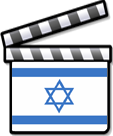Cinema in Israel Posted by Sean Young on Jun 26, 2012
קוֹלְנוֹעַ יִשְׂרְאֵלִי (kol-no-a is-re-li – Israeli Cinema) refers to movie production in Israel since its founding in 1948. Most Israeli films are produced in Hebrew. Israel has been nominated for more Academy Awards for Best Foreign Language Film than any other country in the Middle East. Before 1968 about 3 million Israelis went to the…
Testing Yourself Posted by Sean Young on Jun 19, 2012
Today’s date: 29th of Sivan, 5772 – כ״ט בסיון תשע״ב שלום! How’s it going? Today I want to see how well you’ve been learning Hebrew. We’re going to build up on what I’ve posted and make an actual conversation where you meet someone, greet them, ask how they are doing, where they’re from, etc. okay?…
Counting in Hebrew Posted by Sean Young on Jun 13, 2012
Numbers in Hebrew can be a confusing topic. So I hope by the end of this post, you’ll have a basic understanding of the Hebrew number system and how to read and write them. In English we have two types of numbers: cardinal (one, two, three, four, etc) and ordinal: first, second, third, fourth and…
Building Your Vocabulary Posted by Sean Young on Jun 11, 2012
A couple of weeks ago, I put up a post on Hebrew You Already Know. A language can be a powerful, yet flexible tool. Learning new words is a constant activity in language learning. While memorizing vocabulary lists is helpful, it is more important to learn the words you need in a real situation. Your…
Are You Hungry? Posted by Sean Young on May 30, 2012
אֲנִי רָעֵב! Eating is a great way to explore another culture. And food is one of my favorite subjects. Breakfast – אֲרוּחַת בֹּקֶר Israelis like their breakfast. While the term “breakfast” is identical worldwide, an Israeli breakfast is slightly different from what you had in mind. Typically it includes the following: fresh juice, coffee or…
Roots and Patterns Posted by Sean Young on May 29, 2012
Did you know that Hebrew and Arabic have a unique feature when it comes to building vocabulary? They use roots and patterns (called מִשְׁקָלִים – meesh-ka-leem) to build more words. Most often, a root consists of three consonant letters. Sometimes there are four, rarely two. Let’s take an example. I’m going to take a common…
Asking About Nationality or Origin Posted by Sean Young on May 28, 2012
Look at this short dialog: אני מישראל גם אני מישראל. אני מנְתַנְיָה ah-nee mees-rah-ehl (I’m from Israel) gam ah-nee mees-rah-ehl. ah-nee mee-neh-tahn-yah (I’m also from Israel. I’m from Nethanya) Saying where you are from is pretty easy in Hebrew. All you need to do is add the suffix מֵ- – meh (or מִ- – mee)…



